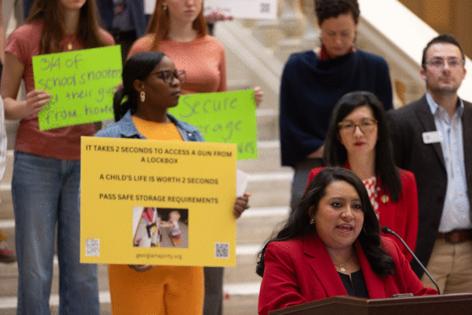Georgia families urge Gov. Brian Kemp to veto school cellphone ban, citing safety concerns
Published in News & Features
ATLANTA — Some lawmakers who voted in favor of banning cellphones in Georgia public schools for students in grades K-8 said they felt like the legislation would make schools safer.
“This is indeed … the first and only school safety bill, true school safety bill, that we’ve heard this year,” said Sen. Jason Esteves, D-Atlanta, before voting in favor of the ban last week.
But the families of students who were at Apalachee High School on Sept. 4, when a 14-year-old is accused of shooting and killing four people, don’t see it that way. They’ve asked Gov. Brian Kemp to veto the bill.
“Gov. Kemp, I also urge you to reconsider the cellphone ban in schools,” Tinya Brown, whose daughter is a freshman at Apalachee High, said at a press conference Friday demanding lawmakers take action about gun violence. “It was only through text messages that parents knew what was happening.”
Layla Renee Contreras, whose sister goes to the school and whose mom works there, asked for the same.
“Now, instead of counteracting these root issues (of gun violence), a cellphone ban for kindergarten through eighth grade is about to be signed into law. A ban that does nothing to keep our kids safe from school shootings. A ban that ignores the very real and present dangers our communities face,” she said. “I’m not here to dismiss the work that’s been done. I’m here to say it’s not enough.”
Brown, Contreras and others at the press conference criticized lawmakers for not taking action to address firearm access after the deadliest school shooting in Georgia’s history.
A spokesperson for Kemp said that security and safety has been a top priority throughout his administration, including after the Apalachee High shooting.
“As with all legislation passed by the General Assembly, (the cellphone ban) will undergo a thorough review process during the 40 days following the conclusion of the legislative session before the governor makes any decisions,” the spokesperson said in a statement.
Brown and Contreras said the texts they received from their loved ones on Sept. 4 informed their opinion that a ban was not the right move. Brown’s daughter texted her and asked her to call 911 and said she loved her. Brown wasn’t able to get through to the police station or the school, and two hours passed before she learned her daughter was safe. Contreras’s sister texted her from someone else’s phone. “It’s real,” she wrote.
Their experiences echo those of other families from Barrow County, where Apalachee High is located. Those family members have said that they got text messages from their students before they got notification from the school.
Schools in the Atlanta area that have already implemented a cellphone ban say they’ve established protocols to notify families in case of an emergency. Advocates of the ban say cellphones can be distracting in an emergency if students are on their phones rather than paying attention to teachers and law enforcement.
In the same week they approved the cellphone ban, lawmakers changed House Bill 79, which would give tax credits to people for the safe storage of guns, to include a sales tax holiday for people who purchase guns or ammunition. Lawmakers also removed a portion of House Bill 268 — the omnibus school safety bill — that would establish a database of school threats. Brown, Contreras and other school safety advocates hoped the database would help school officials intervene before students turn to violence.
Last year, Kemp signed more than 300 bills into law; he vetoed 12.
©2025 The Atlanta Journal-Constitution. Visit at ajc.com. Distributed by Tribune Content Agency, LLC.







Comments